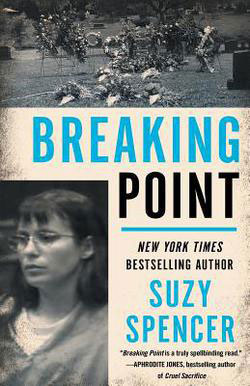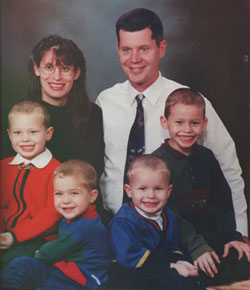 Suzy Spencer is the author of the book Breaking Point, which deals with the case of Andrea Yates—the woman who drowned all five of her children in 2001, just three months before September 11th, leading to an insanity plea that shocked and appalled the nation. She has also written a number of other true crime books, including The Fortune Hunter and Wasted, and has been a reporter for years.
Suzy Spencer is the author of the book Breaking Point, which deals with the case of Andrea Yates—the woman who drowned all five of her children in 2001, just three months before September 11th, leading to an insanity plea that shocked and appalled the nation. She has also written a number of other true crime books, including The Fortune Hunter and Wasted, and has been a reporter for years.
Recently, we had the opportunity to get an interview with Suzy to ask her about her career as a true crime writer, as well as, some specifics about the case that inspired the book. Below is an exclusive Q&A with Ms. Spencer:
How did you get your start as a true crime writer?
I fell into writing true crime.
In the fall of 1996, a friend said to me there’s this really trashy murder and you have to write about it. She is a writer, so I repeatedly asked her why she didn’t write about it. She never answered except to say, “You have to write about it.”
I checked into the case. It sounded interesting. I contacted the prosecutor, who—to my shock—agreed to meet me for lunch. I say “to my shock” because I didn’t have any true crime writing experience. None at all.
The prosecutor and I met. Again, I found the case interesting, so I sent a letter to a New York editor I knew. For the first page, I chit-chatted about life, but on the second page I closed by saying I was researching a murder and gave her a one paragraph synopsis of the case. Then I forgot about it.
In the winter of 1997, another friend contacted me and told me about a literary agent who was looking for true crime book proposals and suggested I send him one. I did—on the trashy murder. The agent liked the story, but hated my proposal, and I hated his suggested changes to the proposal (though he was right and I was wrong). So, again, I forgot about it.
But unknown to me, my editor friend had bumped up my letter to her editor-in-chief, who phoned me in the spring of 1997 and asked if I had a book proposal. Since I just so happened to, I sent him the proposal. A few weeks later, he offered me my first book contract. That contract was for Wasted, the story of a wealthy young lesbian, who’d played saxophone in her high school marching band; her University of Texas co-ed lover, who’d been a high school cheerleader and National Honor Society member; and the handsome, drug-dealing, former blue chip football player, who came between them.
What is the strangest/most disturbing/most surprising thing you've encountered during your true crime career?
Oh, gosh, there are so many things. I was subpoenaed by the prosecution and defense to testify against and for Justin Thomas, the killer in Wasted, in a second murder trial where he received the death penalty. That was disturbing and surprising because as a journalist, I’m supposed to report the story, not become part of it.
Similarly, in 2003, the judge on the Andrea Yates case yanked my press credentials for Andrea’s first trial. That didn’t simply surprise me. It stunned and devastated me, especially after I was told by numerous people that the judge had yanked my credentials because she believed I was in cahoots with Rusty Yates. Her utterly false accusation was based—I was told—on my writing in Breaking Point that Rusty had a plan to affect the outcome of the trial, and the fact that I outlined his plan in a few brief paragraphs.
The only plan I had was to cover the trial so that I could write an update to Breaking Point, which was originally published before the first trial.
Since the judge yanked my press credentials, I was forced to sue her in an attempt to get back my credentials, which to my chagrin forced me to become part of the story.
I lost the lawsuit, but I managed to attend every day of the trial by arriving at the courthouse, each day, hours before court convened to stand in line and obtain a spectator pass. And thanks to Diversion Books, I am finally able to provide the public with my detailed coverage of Andrea Yates’s first trial.
Tell me a bit about the book and the case.
 For those who don’t know, Andrea Yates was the Houston mother who methodically drowned her five children in the family bathtub on June 20, 2001. Immediately afterwards, she phoned the police and said, “I killed my children.” It was a case that divided the nation—as it enraged many and created empathy in others.
For those who don’t know, Andrea Yates was the Houston mother who methodically drowned her five children in the family bathtub on June 20, 2001. Immediately afterwards, she phoned the police and said, “I killed my children.” It was a case that divided the nation—as it enraged many and created empathy in others.
How was the suspect finally caught?
Quickly, police officers arrived at the Yates’s home and arrested the young mother. And just as quickly, the police began leaking details to the press:
Andrea had been planning for months to kill the children.
She’d chased down her eldest son Noah, whose hips were badly bruised from trying to fight off his mother while she forced him beneath the water.
After the children died, she laid them on the bed, shoulder to shoulder, their eyes open.
After the police arrived, Andrea calmly pointed out to them where they could find a clean glass for water.
But as the press did they’re research, they found much more to the story.
What did they find?
They discovered a history of mental illness including post-partum depression and psychosis. It was so severe at the time of the murders that Yates’s attorneys pursued a not guilty by reason of insanity verdict. And it was so severe in the weeks and months after the murders that her attorneys requested a competency hearing to ensure she was mentally able to help with her own defense. That hearing was to begin on September 11, 2001—the day the World Trade Center fell. Immediately, the world’s focus shifted from a Houston housewife’s five dead babies to 3000 murdered New Yorkers.
Why is that important?
Up until that time, Andrea’s husband, Rusty Yates, seemingly had used the news media’s listening ears as his grief support group. And he was choosing the listening ears of major national media outlets, not an independent true crime writer from Austin, Texas.
After 9/11, Rusty had no one to talk to…except me. So, he gave me a tour of his home. I stood in the bathroom where Andrea drowned the children. I stood in the bedroom where she laid them after they died. I interviewed him as I sat on the loveseat on which Andrea had sat after telling the police she’d killed her children.
Rusty emailed me videos that Andrea had made of the children. He then phoned me and we talked about them. I also met him at an anti-death penalty rally and interviewed him more as he marched around the governor’s mansion.
Wasn’t there a gag order on potential witnesses? Wasn’t Rusty breaking the gag order?
Yes. And yes. But that was irrelevant because he wasn’t the only one breaking the gag order. So was the district attorney, Chuck Rosenthal. Also, after Andrea’s 2002 trial—as opposed to the 2001 competency hearing—the judge’s gag order was deemed unconstitutional.
What happened during the trial?
In 2001, Andrea Yates was found competent to stand trial. In 2002, the trial proceeded, and Andrea was found guilty of murdering her children. However, just before the jurors began deliberating, the defense team learned that famed forensic psychiatrist Dr. Park Dietz, who was the prosecution’s expert psychiatric witness, had given false testimony. Despite knowing that, the judge refused to declare a mistrial. The judge did tell the jurors about the false testimony, but she then immediately instructed them to consider all testimony. That false testimony became the bedrock of the defense’s appeal, which it won in 2005. Andrea Yates received her retrial in 2006 and was found not guilty by reason of insanity.
When you think about this case, what is the one thing you most remember?
I can’t pin this down to one thing. It’d have to be two. Attending the children’s funeral in 2001 and the looks on her mother’s and favorite brother’s faces when the guilty verdict was read in 2002.
To learn more or order a copy, visit:
Suzy Spencer, New York Times bestselling author, wrote the controversial true crime book Wasted, a 1999 Violet Crown Book Award finalist, as well as Wages of Sin. Spencer is the recipient of two Chilton Editorial Awards and a three-time semi-finalist in the Pirate's Alley Faulkner Awards. She holds a Masters of Professional Writing and a Masters of Business Administration, both from the University of Southern California. She lives in Texas.
